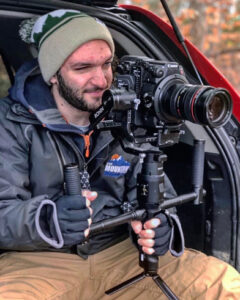Canton High alum documents K-9’s journey of healing
By Mary Ann PriceThe story below appears in the Citizen’s 32nd annual Salute to the Fine Arts, an 8-page special section included with the June 1 print edition.
Healing Dakota, a new documentary film, chronicles the story of Dakota, a German shepherd suffering from PTSD, and Jim Lamonte, the man who worked to help him find happiness. Lamonte founded K9 PTSD Center, a nonprofit, in Seekonk to rehabilitate traumatized dogs like Dakota, who served as a K-9 officer for several years until the stressful nature of his job made it impossible for him to continue. Zach Levenson, a 2012 graduate of Canton High School, is the cinematographer of Healing Dakota, the first documentary that he has filmed.
Levenson, a freelance videographer who has a bachelor’s degree in film and video production from Fitchburg State University, met Lamonte about five years ago when Lamonte was training German shepherds for the military and police forces. At one point, he told Levenson about a dog he had taken in who was exhibiting signs of PTSD and was being retired from a police force; that dog was Dakota. Lamonte was interested in having a documentary created about him, and Levenson became the cinematographer. Lamonte was the director.
Levenson said it was an “exciting learning process” for both men, since it was their first experience making a documentary. Lamonte put together a team of editors, producers, and people with film and music experience who worked together on the project. “It worked out really well,” Levenson said.
Dakota, who passed away last year, was from the Czech Republic and trained to work as a K-9 officer. His first assignment was with the Newton Police Department before moving to other departments. He learned how to sniff out drugs and to bite suspects to take them down, something he did well. On April 15, 2013, Dakota and his partner went to the site of the Boston Marathon bombing in order for Dakota to sniff out clues and evidence. “He was there that day,” Levenson said.
When Lamonte met Dakota, he saw that the dog was showing signs of PTSD, following years of drug busts and capturing suspects. “He realized Dakota was suffering,” Levenson said.
That encounter was a pivotal moment for both man and dog and led Lamonte to change his career and work to rehabilitate dogs. Lamonte’s center became the forever home for the dogs he worked with. The K9s who are in rehabilitation at the center are not available for adoption, but can be virtually adopted as a way to support them and the center. Levenson said that Lamonte typically has seven to 12 dogs at the center at any given time.
Healing Dakota was filmed over three years, which included periods of filming and then editing the film and deciding what was needed next. The bulk of the filming took place in Seekonk, while some scenes were filmed at Tufts Veterinary Clinic. The crew also traveled to Indianapolis to interview a dog trainer. While Levenson was the principal cinematographer, there were secondary cameras for some filming. “The filming started after Lamonte had done the heavy bulk of PTSD rehab with Dakota,” he said.
Levenson is not a dog person, but he developed a relationship with Dakota over the course of the filming. “I did get a little close to him,” he said. “He did get used to me. Dakota doesn’t trust anyone except Jim. We did some filming off leash behind fences. It was definitely a little nerve-wracking, (but) the filming was very safe.”
He described Lamonte as a passionate person who was very consistent in his rehabilitation work with Dakota, and the result of this work, noted Levenson, was a “more happy and relaxed dog.”
The fun facts listed on the website about the film state that over 50 bags of dog treats were used during the filming; Dakota was treated to steak tips and real salmon after shoot days; and filming was canceled on days when Dakota did not seem to feel like working. His health was more important.
Levenson added that Lamonte put together a crew that was a small, low-key, and laid back group of professionals. “But serious and well organized,” he said.
Ed McDonough teaches Video and Media Production at Canton High School and was Levenson’s teacher. McDonough was among the 175 friends, family, locals, and police force members who attended the premiere of Healing Dakota in March of this year at the 23rd Martha’s Vineyard Film Festival. “Remarkable cinematography,” McDonough said. “Zach visually captured the trusting relationship between (Jim) and Dakota eloquently. I was so proud of his commercial work and now his foray into the independent film festival circuit. Zach is a young man who followed his passion and is getting paid to do what he loves.”
“I am so grateful that Dakota allowed me to be part of his life and to share his story with you,” Lamont wrote for the Healing Dakota website. “Dakota gave me the greatest gift I have ever received in my life … hope.”
Levenson films weddings and corporate events and had been doing other small projects while searching for a documentary topic. He said that the story of Lamonte and Dakota was the one he was waiting for. He is spending time at the K9 PTSD Center and hopes to film more documentaries about it as well as others that will include his love of fishing and the outdoors.
“It was very exciting,” Levenson said of filming Healing Dakota. “I had so much to learn and even at the end I have so much to learn. I was really honored to have the opportunity to capture their experience. I absolutely loved the whole process. Every day I would learn something new about Jim and Dakota. They saved each other.”
Short URL: https://www.thecantoncitizen.com/?p=113467











